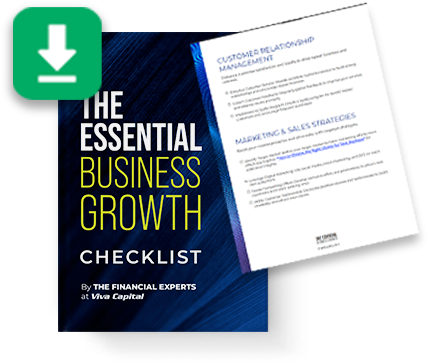
Rising interest rates may soon impact your business and access to credit if they aren’t already. These incremental shifts aren’t always a bad thing and can actually benefit businesses in the long run but they may require some pivots in the interim.
But, what changes might you need to make and how do interest rates affect businesses? We’ll explore the answers in detail below.
Why Are Interest Rates Rising?
One of the hottest topics in recent years is rising inflation. The federal government typically targets a two percent inflation rate and sets monetary policy in support of it. The value of the dollar holds steady enough to maintain consumer comfort and economic growth is supported at this rate. However, 12-month inflation rates began climbing in early 2021 and hit a 40-year high of over nine percent in 2022, per U.S. Inflation Calculator.
This extreme level of inflation made it harder for people to afford everyday items, from groceries to fuel and rent. The government hikes interest rates to reduce borrowing and spending, which then decreases demand for goods and services. Prices subsequently decline and inflation drops.
What do higher interest rates mean for businesses? The federal shift impacts interest rates in business and consumer markets, thereby influencing financing and investments too. This can have both positive and negative outcomes.
Negative Impact of Rising Interest Rates on Businesses
How can interest rates affect a business negatively? Although the intent of the recent interest hikes is to spur economic growth, which can help businesses, the shift can create some major challenges, as highlighted below.
Increased Borrowing Costs
One of the biggest effects of high-interest rates on businesses is increased borrowing costs. Because of the high-interest rates, banks begin charging a premium for both business loans and personal loans. This means that businesses may not be able to afford to borrow or need to find ways to work with reduced funding. Industries that rely on lending as part of the sales process, such as auto sales and real estate, also tend to see reduced sales.
Reduced Ability to Pay Debts
Because increased interest in business debts boosts overall costs, companies have less cash to put toward outstanding debts. That means it often takes longer to pay down debt and businesses pay more over the duration of their loans.
Slowed Business Growth
Most businesses tap into some type of funding as they expand and grow. However, the increased cost to borrow and present lender retreat means that fewer businesses will have access to credit going forward. Furthermore, interest hikes reduce consumer spending by design. These things often combine to dramatically slow or even stop business growth.
Rising Cost of Goods Driving Supplier Price Hikes
Simply put, virtually everything costs more now than it did a few months ago and considerably more than it did a year or two ago. Supplier pricing has been rising steadily alongside it, and, as suppliers face issues like reduced access to credit, the cost of goods and services can be expected to climb for many.
Dwindling Cash Reserves
The current economic conditions impact profit margins on both sides. On the one hand, businesses pay more for things like supplies and borrowing. On the other hand, businesses also bring in less due to reduced consumer and business spending. This means businesses must place greater focus on cash flow management to ensure everyday expenses like supplies and payroll are covered.
Positive Impact of Rising Interest Rates on Businesses
Those wondering what happens if interest rates increase may take some comfort in knowing that hikes are not always a bad thing for businesses. For instance, those with large amounts of cash investments may see greater returns. Those with positive cash flow can invest and may achieve the same results.
Businesses with negative working capital or excess cash on the balance sheet may also benefit from increasing interest rates. This typically happens when the business collects for services or goods in advance of delivery. Because they have a surplus of cash, they’re more able to make ends meet and invest in business growth, which can provide a competitive advantage.
What Can Small Business Owners Do to Prepare for Increasing Interest Rates?
- Review your current debt. Understand your current borrowing costs, interest rates, and repayment terms to assess how increasing rates may impact your business’s finances.
- Create a cash flow projection. Anticipate the potential impact of rising interest rates on your cash flow and plan accordingly.
- Consider refinancing or consolidating debt. Explore opportunities to refinance existing loans or consolidate high-interest debt to secure more favorable rates and terms.
- Build a contingency fund. Set aside funds to mitigate the impact of higher borrowing costs.
- Strengthen your credit profile. Maintain a strong personal and business credit history to enhance your eligibility for lower rates.
- Negotiate with suppliers. Seek better terms or discounts from suppliers to offset potential increases in costs caused by interest rate hikes.
- Monitor market trends. Stay updated on economic indicators and interest rate forecasts to make informed business decisions.
- Seek professional advice. Consult with financial advisors or small business administration experts to develop a comprehensive strategy to prepare for rising interest rates.
Can Small Businesses Still Get Loans with Rising Interest Rates?
Yes, small businesses can still get loans even with rising interest rates. While higher interest rates may impact the borrowing costs for small businesses, it does not mean that loans are completely unavailable.
Are There Alternative Financing Options for Small Businesses Besides Traditional Loans?
Yes, there are alternative financing options available for small businesses. These options include merchant cash advances, invoice factoring, lines of credit, and other types of funding that do not solely rely on traditional borrowing from banks or financial institutions.
Tips for Businesses Coping with Rising Interest Rates
Whether your business is already struggling due to high-interest rates or you want to shore things up to prevent issues, there are a few steps you can take right now that will help.
Know Your Numbers
Run a cash flow analysis to get a better understanding of your financial health now and in the future. That way, you’ll know if you’re likely to come up short and can take steps to address working capital shortages before they happen.
Pay off High-Interest Debts and Revolving Credit
Pay off as much debt as possible to minimize your overall cost to borrow and keep more money in your business.
Run a Risk Management Analysis
A thorough risk management analysis will help you pinpoint potential problems and help ensure you have a plan to mitigate issues if they creep up. That way, your business is prepared and will recover faster if any issues come up.
Run Lean
Start making changes if you’re able to cut back or automate processes. The more you reduce your expenses, the easier it will be for you to cope with rising costs in other areas.
Have a Backup Funding Source
Because most businesses need funding at some point or another, it’s important to have a backup source of funding. As interest rates rise, interest-free and debt-free options like invoice factoring are often a more ideal funding solution. Factoring is like getting an advance on your B2B invoices. The advance is paid off when the client pays their invoice, so no debt is created. That also means there’s no interest to pay back either.
What Are the Advantages of Invoice Factoring Over Traditional Business Loans?
Invoice factoring offers several advantages over traditional business loans. Firstly, invoice factoring does not require collateral, such as assets or property, making it more accessible for small businesses. Secondly, the approval process for invoice factoring is typically faster than traditional loans, providing businesses with quicker access to funds. Additionally, invoice factoring does not add to your business credit, which can be beneficial if you are looking to maintain or improve your credit score. Lastly, invoice factoring helps you avoid rising interest costs associated with borrowing from lenders.
Get a Free Invoice Factoring Quote from Viva
If rising interest rates are preventing your business from accessing capital, covering everyday expenses, or growing, invoice factoring from Viva can help. Request a complimentary quote to learn more or get started.
- How Mid-Sized Companies Use Factoring to Drive Growth - May 23, 2025
- 10 Best Cash Flow and Budgeting Tools for Business Owners - May 2, 2025
- Business Factoring Success Stories: How Real Brands Benefit - March 31, 2025



